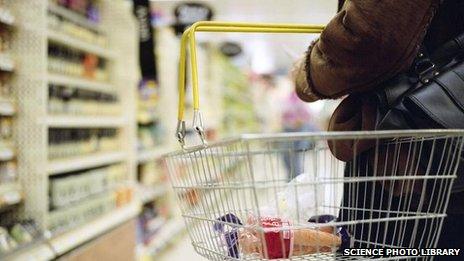Most people classed as being in poverty 'have job'
- Published
- comments

Researchers said the number of people in low-paid jobs had risen, with average incomes falling by 8% since their peak in 2008
More working households were living in poverty in the UK last year than non-working ones - for the first time, a charity has reported.
Just over half of the 13 million people in poverty - surviving on less than 60% of the national median (middle) income - were from working families, it said.
The Joseph Rowntree Foundation said low pay and part-time work had prompted an unprecedented fall in living standards.
But it said the number of pensioners in poverty was at a 30-year low.
Ministers insisted that work remained the best route out of poverty and said the government's welfare reforms would further encourage people to get a job.
'Little security'
The JRF's annual Monitoring Poverty and Social Exclusion report, external was written by the New Policy Institute and tracks a range of indicators, including government data and surveys covering income, education and social security.
The poverty measure it defines is based on net household income, adjusted for family size and after housing costs have been deducted.
In the 2011-12 period, the amount of earnings before a household was said to be in poverty was £128 a week for a single adult; £172 for a single parent with one child; £220 for a couple with no children, and £357 for a couple with two children.
Assessing Department for Work and Pensions figures, the report's authors found working adults without dependent children were the most likely group to be living in poverty, and that child poverty was at its lowest level for 25 years.
It said the number of people in low-paid jobs had risen, with average incomes falling by 8% since their peak in 2008.
It also credited private pensions, pension credits and the government's determination to shield retired people from austerity measures for the fact that the number of pensioners living in poverty had fallen to its lowest level in decades.
The JRF report acknowledged that the jobs market this year appeared to be reviving, while the number of jobless young people looked to have peaked.
But it said that while the overall poverty rate in the UK expressed as a proportion of the population was 21% - the second lowest since reliable official statistics began to be collected in the mid-1990s - the figures understated the squeeze there had been on people with low incomes and those affected by benefit changes.
Julia Unwin, Chief Executive of JRF, said: "We have a labour market that lacks pay and protection, with jobs offering precious little security and paltry wages that are insufficient to make ends meet.
"While a recovery may be gathering momentum in the statistics and official forecasts, for those at the bottom, improving pay and prospects remain a mirage."
Shadow work and pensions secretary Rachel Reeves said low wages were a "major contributor" to the cost-of-living crisis and a key driver behind a rising benefits bill.
"It's not right that millions of people are going out to work, working harder and harder, and can't afford to bring up their families," she said.
"That's why Labour will strengthen the minimum wage, promote the living wage, and deal with the cost-of-living crisis so we can have a recovery that benefits working people."
A Department for Work and Pensions spokesperson said: "Despite claims to the contrary, work absolutely remains the best route out poverty - children in workless families are around three times more likely to be in poverty than those in working families.
"Our welfare reforms are designed to further increase work incentives and improve the lives of some of the poorest families in our communities, with the [new benefit system] Universal Credit making three million households better off."
- Published4 December 2013
- Published4 November 2013
- Published17 October 2013
- Published13 June 2013
- Published15 November 2012